Exploring the Significance of Egyptian Mythology in Ancient Culture
VerifiedAdded on 2020/06/05
|10
|2711
|236
Essay
AI Summary
This essay provides a comprehensive overview of Egyptian mythology, exploring its significance in ancient religious practices and cultural aspects. It delves into the polytheistic nature of Egyptian religion, examining the roles of various gods and goddesses, and the influence of the River Nile on their civilization. The essay discusses key themes such as death, rebirth, and the afterlife, including the practice of mummification. It also highlights the importance of mythology in shaping ethical values and understanding the lives of ancient Egyptians. Furthermore, the essay analyzes the major myths, including the Heliopolitan, Hermopolitian, and Memphite myths, and their impact on the beliefs and traditions of the people. The essay concludes by emphasizing the enduring legacy of Egyptian mythology and its contribution to our understanding of ancient civilizations. The essay also covers the cults and temples as the official structure for worshiping the gods.
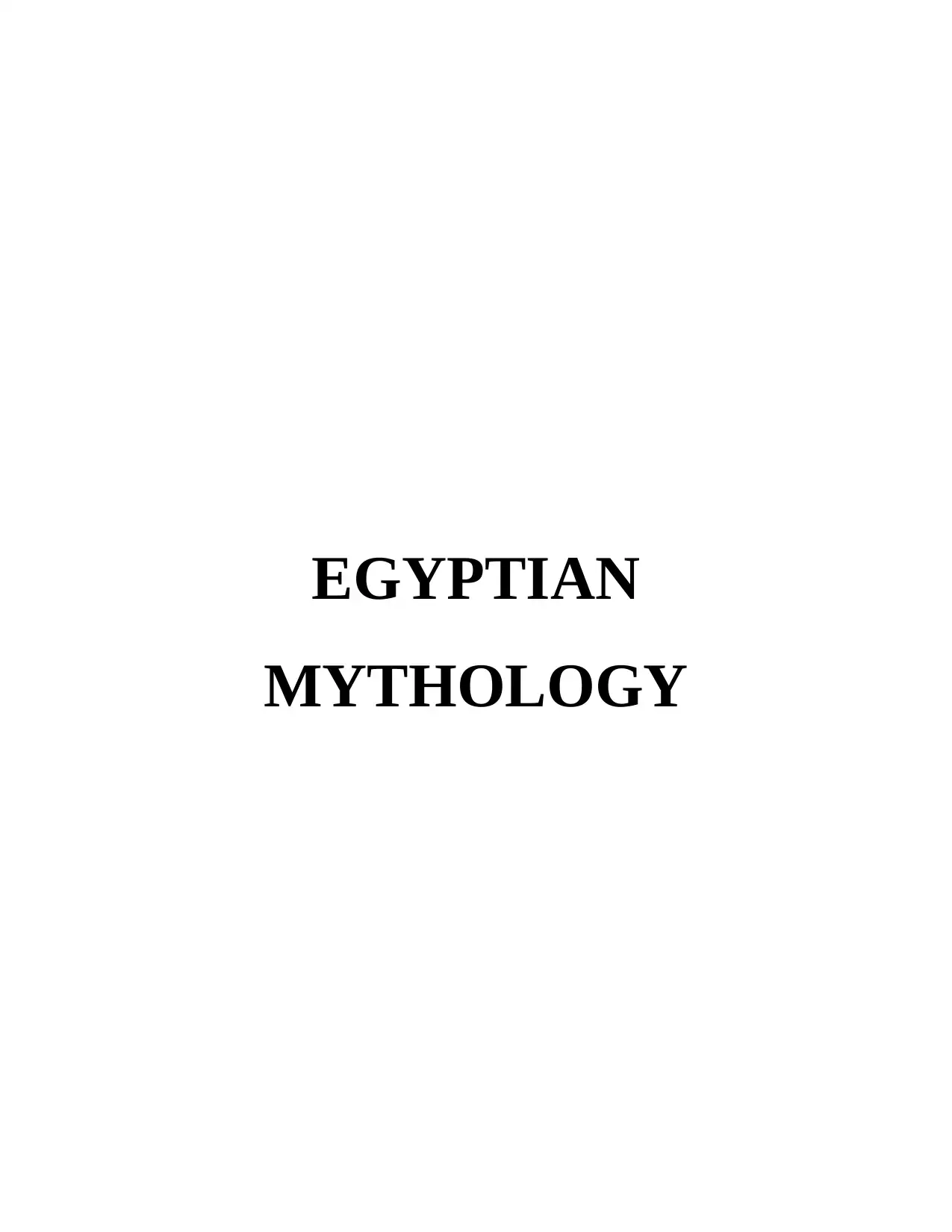
EGYPTIAN
MYTHOLOGY
MYTHOLOGY
Paraphrase This Document
Need a fresh take? Get an instant paraphrase of this document with our AI Paraphraser
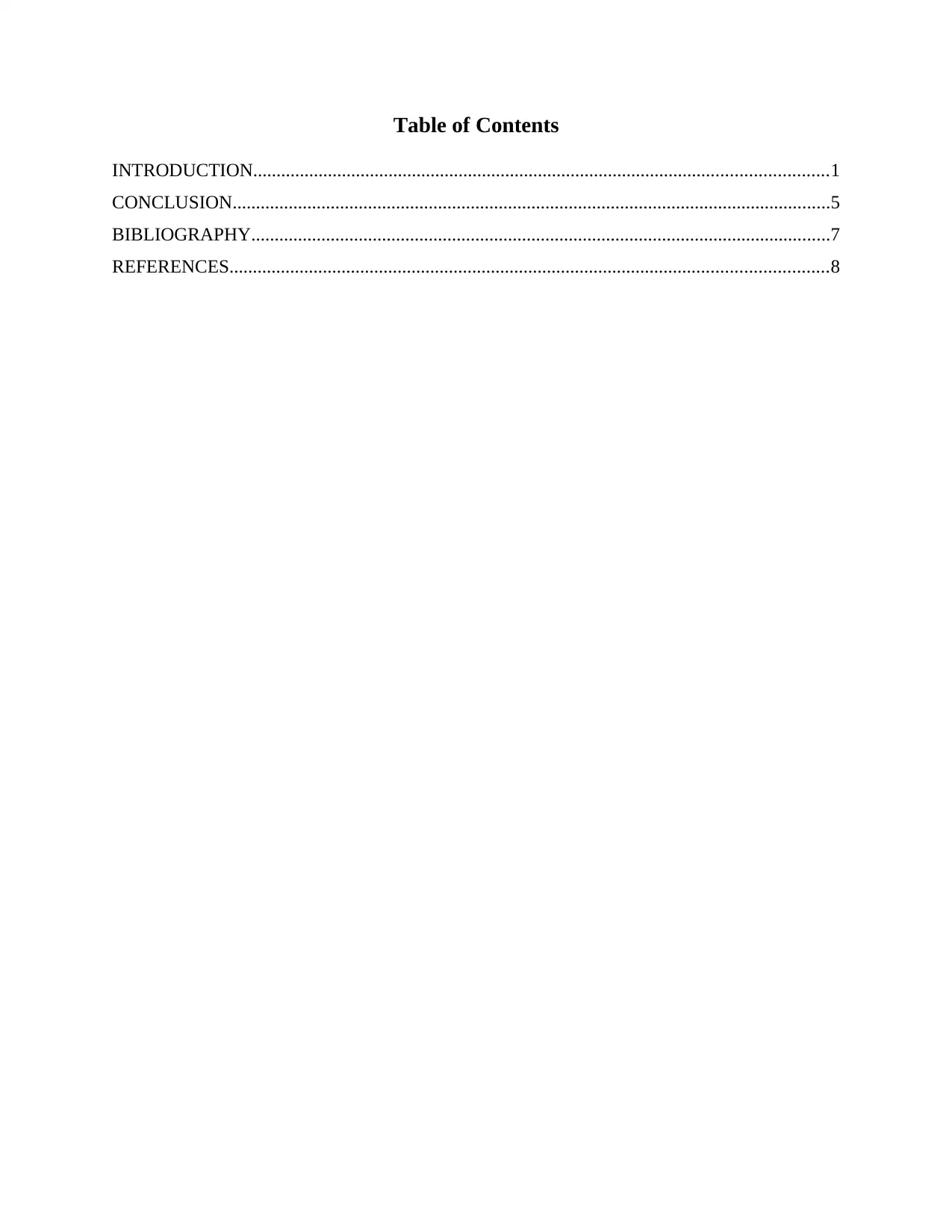
Table of Contents
INTRODUCTION...........................................................................................................................1
CONCLUSION................................................................................................................................5
BIBLIOGRAPHY............................................................................................................................7
REFERENCES................................................................................................................................8
INTRODUCTION...........................................................................................................................1
CONCLUSION................................................................................................................................5
BIBLIOGRAPHY............................................................................................................................7
REFERENCES................................................................................................................................8
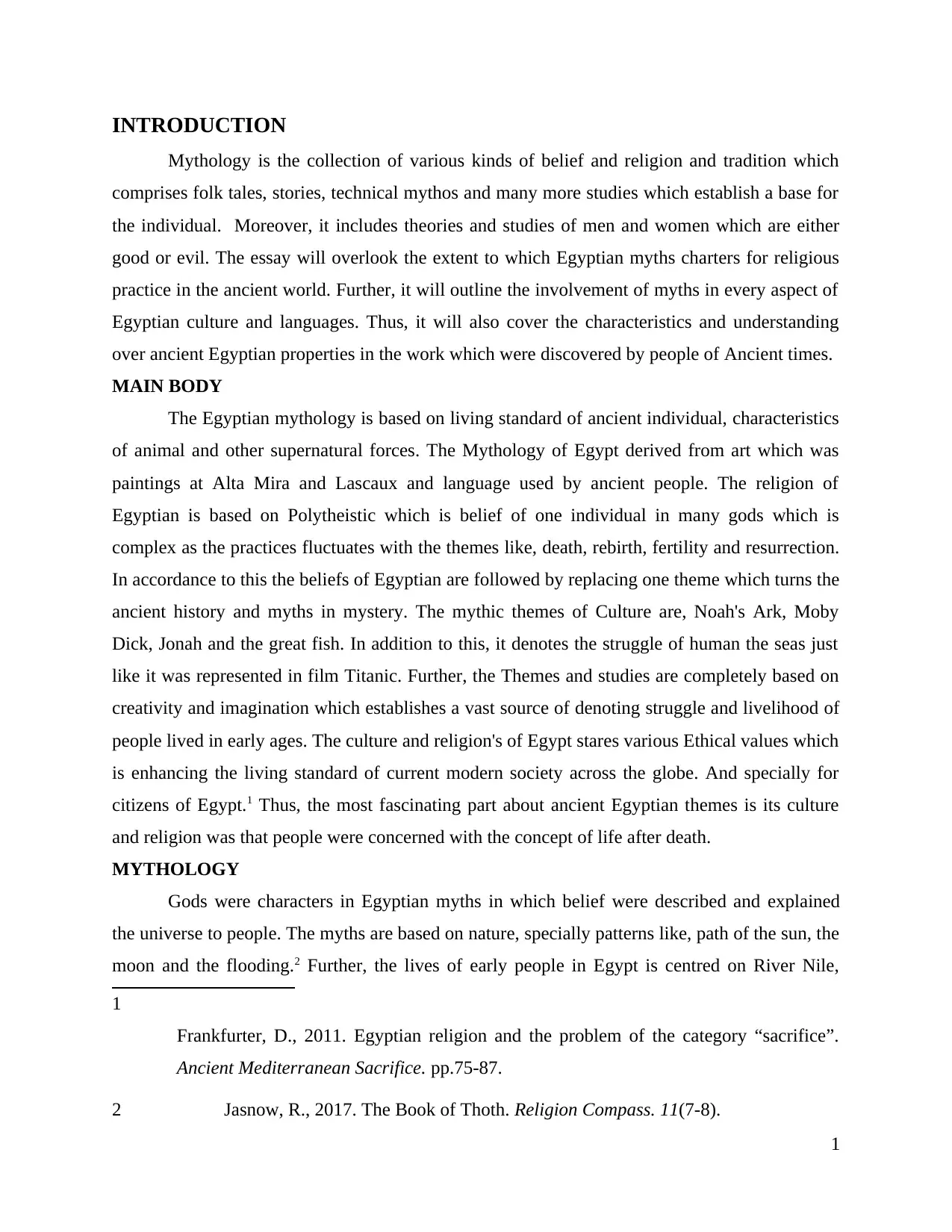
INTRODUCTION
Mythology is the collection of various kinds of belief and religion and tradition which
comprises folk tales, stories, technical mythos and many more studies which establish a base for
the individual. Moreover, it includes theories and studies of men and women which are either
good or evil. The essay will overlook the extent to which Egyptian myths charters for religious
practice in the ancient world. Further, it will outline the involvement of myths in every aspect of
Egyptian culture and languages. Thus, it will also cover the characteristics and understanding
over ancient Egyptian properties in the work which were discovered by people of Ancient times.
MAIN BODY
The Egyptian mythology is based on living standard of ancient individual, characteristics
of animal and other supernatural forces. The Mythology of Egypt derived from art which was
paintings at Alta Mira and Lascaux and language used by ancient people. The religion of
Egyptian is based on Polytheistic which is belief of one individual in many gods which is
complex as the practices fluctuates with the themes like, death, rebirth, fertility and resurrection.
In accordance to this the beliefs of Egyptian are followed by replacing one theme which turns the
ancient history and myths in mystery. The mythic themes of Culture are, Noah's Ark, Moby
Dick, Jonah and the great fish. In addition to this, it denotes the struggle of human the seas just
like it was represented in film Titanic. Further, the Themes and studies are completely based on
creativity and imagination which establishes a vast source of denoting struggle and livelihood of
people lived in early ages. The culture and religion's of Egypt stares various Ethical values which
is enhancing the living standard of current modern society across the globe. And specially for
citizens of Egypt.1 Thus, the most fascinating part about ancient Egyptian themes is its culture
and religion was that people were concerned with the concept of life after death.
MYTHOLOGY
Gods were characters in Egyptian myths in which belief were described and explained
the universe to people. The myths are based on nature, specially patterns like, path of the sun, the
moon and the flooding.2 Further, the lives of early people in Egypt is centred on River Nile,
1
Frankfurter, D., 2011. Egyptian religion and the problem of the category “sacrifice”.
Ancient Mediterranean Sacrifice. pp.75-87.
2 Jasnow, R., 2017. The Book of Thoth. Religion Compass. 11(7-8).
1
Mythology is the collection of various kinds of belief and religion and tradition which
comprises folk tales, stories, technical mythos and many more studies which establish a base for
the individual. Moreover, it includes theories and studies of men and women which are either
good or evil. The essay will overlook the extent to which Egyptian myths charters for religious
practice in the ancient world. Further, it will outline the involvement of myths in every aspect of
Egyptian culture and languages. Thus, it will also cover the characteristics and understanding
over ancient Egyptian properties in the work which were discovered by people of Ancient times.
MAIN BODY
The Egyptian mythology is based on living standard of ancient individual, characteristics
of animal and other supernatural forces. The Mythology of Egypt derived from art which was
paintings at Alta Mira and Lascaux and language used by ancient people. The religion of
Egyptian is based on Polytheistic which is belief of one individual in many gods which is
complex as the practices fluctuates with the themes like, death, rebirth, fertility and resurrection.
In accordance to this the beliefs of Egyptian are followed by replacing one theme which turns the
ancient history and myths in mystery. The mythic themes of Culture are, Noah's Ark, Moby
Dick, Jonah and the great fish. In addition to this, it denotes the struggle of human the seas just
like it was represented in film Titanic. Further, the Themes and studies are completely based on
creativity and imagination which establishes a vast source of denoting struggle and livelihood of
people lived in early ages. The culture and religion's of Egypt stares various Ethical values which
is enhancing the living standard of current modern society across the globe. And specially for
citizens of Egypt.1 Thus, the most fascinating part about ancient Egyptian themes is its culture
and religion was that people were concerned with the concept of life after death.
MYTHOLOGY
Gods were characters in Egyptian myths in which belief were described and explained
the universe to people. The myths are based on nature, specially patterns like, path of the sun, the
moon and the flooding.2 Further, the lives of early people in Egypt is centred on River Nile,
1
Frankfurter, D., 2011. Egyptian religion and the problem of the category “sacrifice”.
Ancient Mediterranean Sacrifice. pp.75-87.
2 Jasnow, R., 2017. The Book of Thoth. Religion Compass. 11(7-8).
1
⊘ This is a preview!⊘
Do you want full access?
Subscribe today to unlock all pages.

Trusted by 1+ million students worldwide
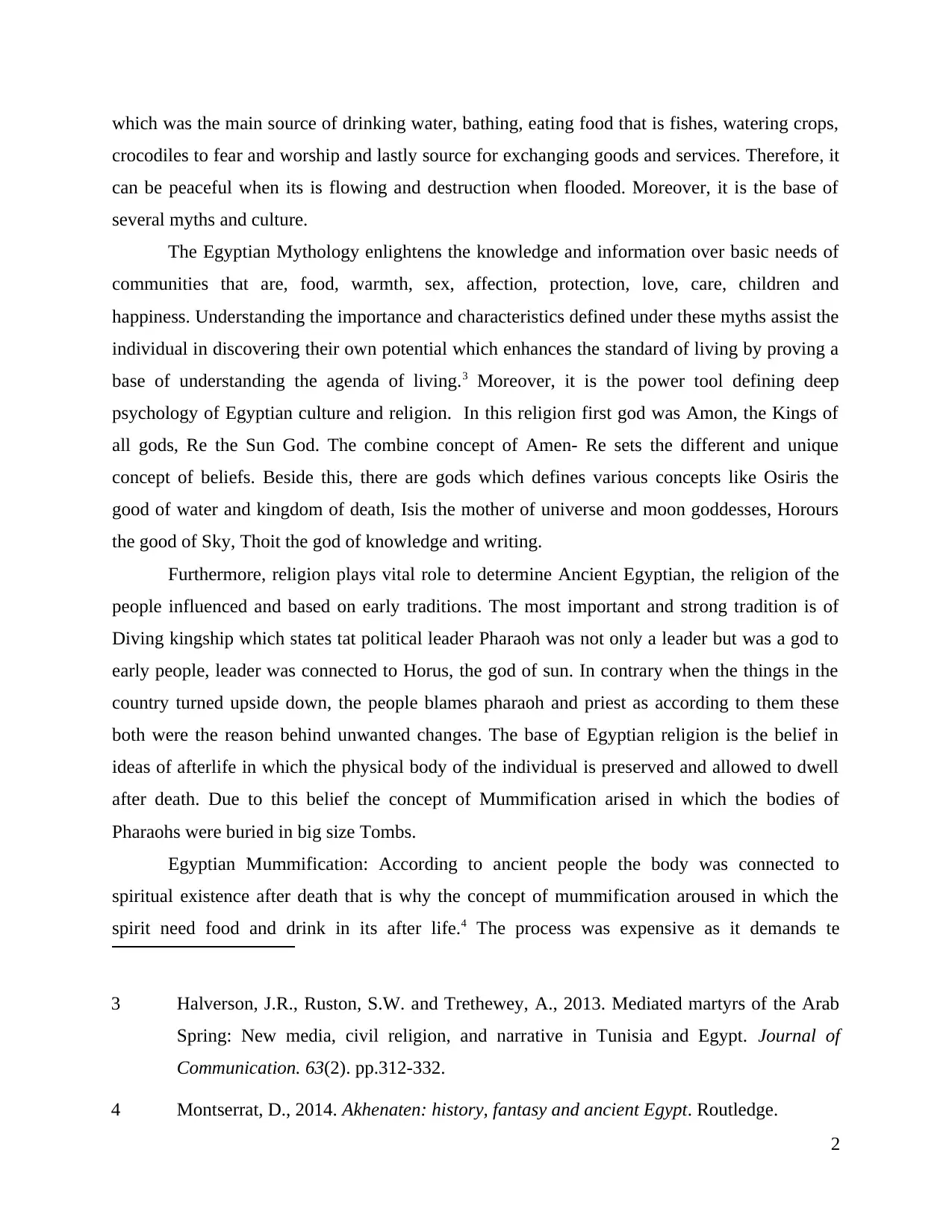
which was the main source of drinking water, bathing, eating food that is fishes, watering crops,
crocodiles to fear and worship and lastly source for exchanging goods and services. Therefore, it
can be peaceful when its is flowing and destruction when flooded. Moreover, it is the base of
several myths and culture.
The Egyptian Mythology enlightens the knowledge and information over basic needs of
communities that are, food, warmth, sex, affection, protection, love, care, children and
happiness. Understanding the importance and characteristics defined under these myths assist the
individual in discovering their own potential which enhances the standard of living by proving a
base of understanding the agenda of living.3 Moreover, it is the power tool defining deep
psychology of Egyptian culture and religion. In this religion first god was Amon, the Kings of
all gods, Re the Sun God. The combine concept of Amen- Re sets the different and unique
concept of beliefs. Beside this, there are gods which defines various concepts like Osiris the
good of water and kingdom of death, Isis the mother of universe and moon goddesses, Horours
the good of Sky, Thoit the god of knowledge and writing.
Furthermore, religion plays vital role to determine Ancient Egyptian, the religion of the
people influenced and based on early traditions. The most important and strong tradition is of
Diving kingship which states tat political leader Pharaoh was not only a leader but was a god to
early people, leader was connected to Horus, the god of sun. In contrary when the things in the
country turned upside down, the people blames pharaoh and priest as according to them these
both were the reason behind unwanted changes. The base of Egyptian religion is the belief in
ideas of afterlife in which the physical body of the individual is preserved and allowed to dwell
after death. Due to this belief the concept of Mummification arised in which the bodies of
Pharaohs were buried in big size Tombs.
Egyptian Mummification: According to ancient people the body was connected to
spiritual existence after death that is why the concept of mummification aroused in which the
spirit need food and drink in its after life.4 The process was expensive as it demands te
3 Halverson, J.R., Ruston, S.W. and Trethewey, A., 2013. Mediated martyrs of the Arab
Spring: New media, civil religion, and narrative in Tunisia and Egypt. Journal of
Communication. 63(2). pp.312-332.
4 Montserrat, D., 2014. Akhenaten: history, fantasy and ancient Egypt. Routledge.
2
crocodiles to fear and worship and lastly source for exchanging goods and services. Therefore, it
can be peaceful when its is flowing and destruction when flooded. Moreover, it is the base of
several myths and culture.
The Egyptian Mythology enlightens the knowledge and information over basic needs of
communities that are, food, warmth, sex, affection, protection, love, care, children and
happiness. Understanding the importance and characteristics defined under these myths assist the
individual in discovering their own potential which enhances the standard of living by proving a
base of understanding the agenda of living.3 Moreover, it is the power tool defining deep
psychology of Egyptian culture and religion. In this religion first god was Amon, the Kings of
all gods, Re the Sun God. The combine concept of Amen- Re sets the different and unique
concept of beliefs. Beside this, there are gods which defines various concepts like Osiris the
good of water and kingdom of death, Isis the mother of universe and moon goddesses, Horours
the good of Sky, Thoit the god of knowledge and writing.
Furthermore, religion plays vital role to determine Ancient Egyptian, the religion of the
people influenced and based on early traditions. The most important and strong tradition is of
Diving kingship which states tat political leader Pharaoh was not only a leader but was a god to
early people, leader was connected to Horus, the god of sun. In contrary when the things in the
country turned upside down, the people blames pharaoh and priest as according to them these
both were the reason behind unwanted changes. The base of Egyptian religion is the belief in
ideas of afterlife in which the physical body of the individual is preserved and allowed to dwell
after death. Due to this belief the concept of Mummification arised in which the bodies of
Pharaohs were buried in big size Tombs.
Egyptian Mummification: According to ancient people the body was connected to
spiritual existence after death that is why the concept of mummification aroused in which the
spirit need food and drink in its after life.4 The process was expensive as it demands te
3 Halverson, J.R., Ruston, S.W. and Trethewey, A., 2013. Mediated martyrs of the Arab
Spring: New media, civil religion, and narrative in Tunisia and Egypt. Journal of
Communication. 63(2). pp.312-332.
4 Montserrat, D., 2014. Akhenaten: history, fantasy and ancient Egypt. Routledge.
2
Paraphrase This Document
Need a fresh take? Get an instant paraphrase of this document with our AI Paraphraser
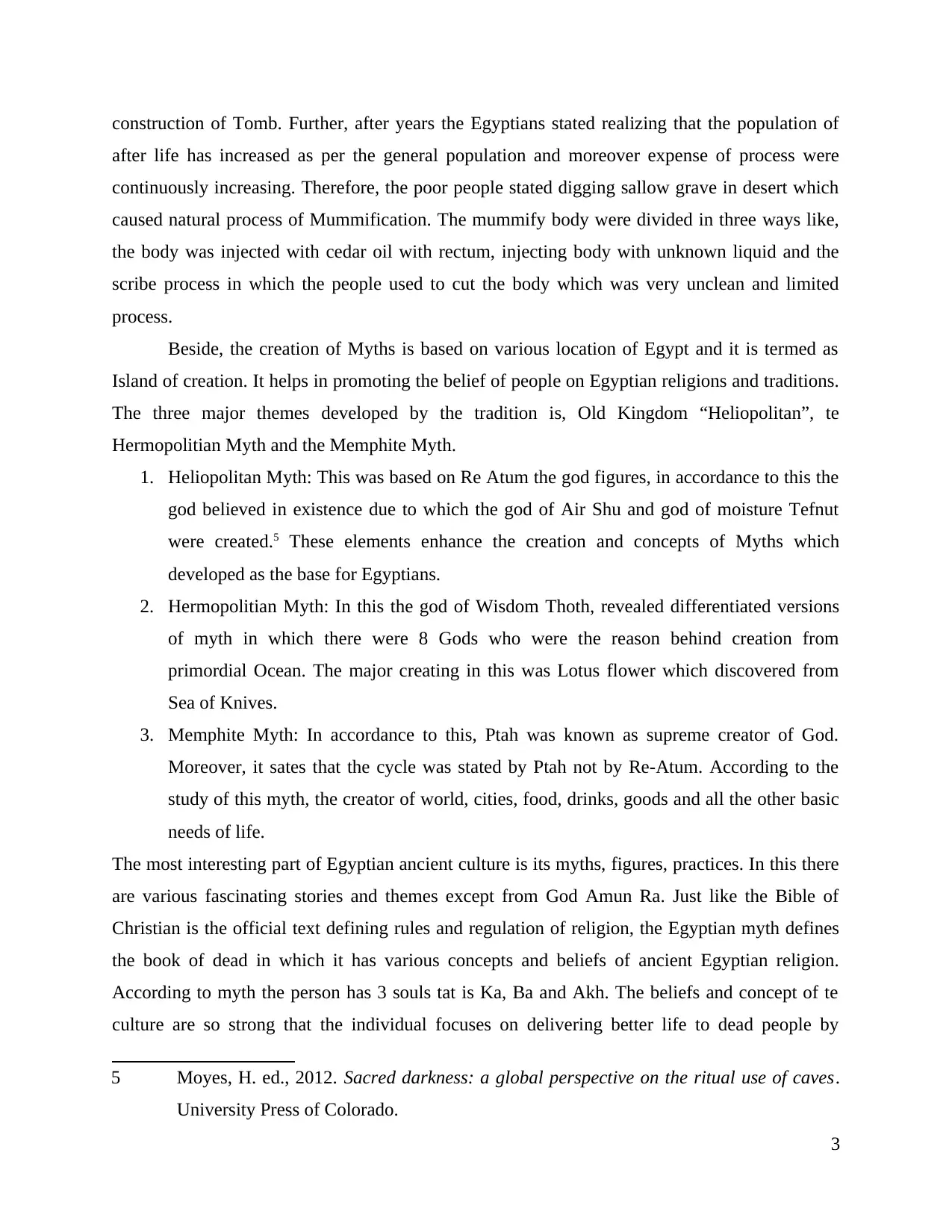
construction of Tomb. Further, after years the Egyptians stated realizing that the population of
after life has increased as per the general population and moreover expense of process were
continuously increasing. Therefore, the poor people stated digging sallow grave in desert which
caused natural process of Mummification. The mummify body were divided in three ways like,
the body was injected with cedar oil with rectum, injecting body with unknown liquid and the
scribe process in which the people used to cut the body which was very unclean and limited
process.
Beside, the creation of Myths is based on various location of Egypt and it is termed as
Island of creation. It helps in promoting the belief of people on Egyptian religions and traditions.
The three major themes developed by the tradition is, Old Kingdom “Heliopolitan”, te
Hermopolitian Myth and the Memphite Myth.
1. Heliopolitan Myth: This was based on Re Atum the god figures, in accordance to this the
god believed in existence due to which the god of Air Shu and god of moisture Tefnut
were created.5 These elements enhance the creation and concepts of Myths which
developed as the base for Egyptians.
2. Hermopolitian Myth: In this the god of Wisdom Thoth, revealed differentiated versions
of myth in which there were 8 Gods who were the reason behind creation from
primordial Ocean. The major creating in this was Lotus flower which discovered from
Sea of Knives.
3. Memphite Myth: In accordance to this, Ptah was known as supreme creator of God.
Moreover, it sates that the cycle was stated by Ptah not by Re-Atum. According to the
study of this myth, the creator of world, cities, food, drinks, goods and all the other basic
needs of life.
The most interesting part of Egyptian ancient culture is its myths, figures, practices. In this there
are various fascinating stories and themes except from God Amun Ra. Just like the Bible of
Christian is the official text defining rules and regulation of religion, the Egyptian myth defines
the book of dead in which it has various concepts and beliefs of ancient Egyptian religion.
According to myth the person has 3 souls tat is Ka, Ba and Akh. The beliefs and concept of te
culture are so strong that the individual focuses on delivering better life to dead people by
5 Moyes, H. ed., 2012. Sacred darkness: a global perspective on the ritual use of caves.
University Press of Colorado.
3
after life has increased as per the general population and moreover expense of process were
continuously increasing. Therefore, the poor people stated digging sallow grave in desert which
caused natural process of Mummification. The mummify body were divided in three ways like,
the body was injected with cedar oil with rectum, injecting body with unknown liquid and the
scribe process in which the people used to cut the body which was very unclean and limited
process.
Beside, the creation of Myths is based on various location of Egypt and it is termed as
Island of creation. It helps in promoting the belief of people on Egyptian religions and traditions.
The three major themes developed by the tradition is, Old Kingdom “Heliopolitan”, te
Hermopolitian Myth and the Memphite Myth.
1. Heliopolitan Myth: This was based on Re Atum the god figures, in accordance to this the
god believed in existence due to which the god of Air Shu and god of moisture Tefnut
were created.5 These elements enhance the creation and concepts of Myths which
developed as the base for Egyptians.
2. Hermopolitian Myth: In this the god of Wisdom Thoth, revealed differentiated versions
of myth in which there were 8 Gods who were the reason behind creation from
primordial Ocean. The major creating in this was Lotus flower which discovered from
Sea of Knives.
3. Memphite Myth: In accordance to this, Ptah was known as supreme creator of God.
Moreover, it sates that the cycle was stated by Ptah not by Re-Atum. According to the
study of this myth, the creator of world, cities, food, drinks, goods and all the other basic
needs of life.
The most interesting part of Egyptian ancient culture is its myths, figures, practices. In this there
are various fascinating stories and themes except from God Amun Ra. Just like the Bible of
Christian is the official text defining rules and regulation of religion, the Egyptian myth defines
the book of dead in which it has various concepts and beliefs of ancient Egyptian religion.
According to myth the person has 3 souls tat is Ka, Ba and Akh. The beliefs and concept of te
culture are so strong that the individual focuses on delivering better life to dead people by
5 Moyes, H. ed., 2012. Sacred darkness: a global perspective on the ritual use of caves.
University Press of Colorado.
3
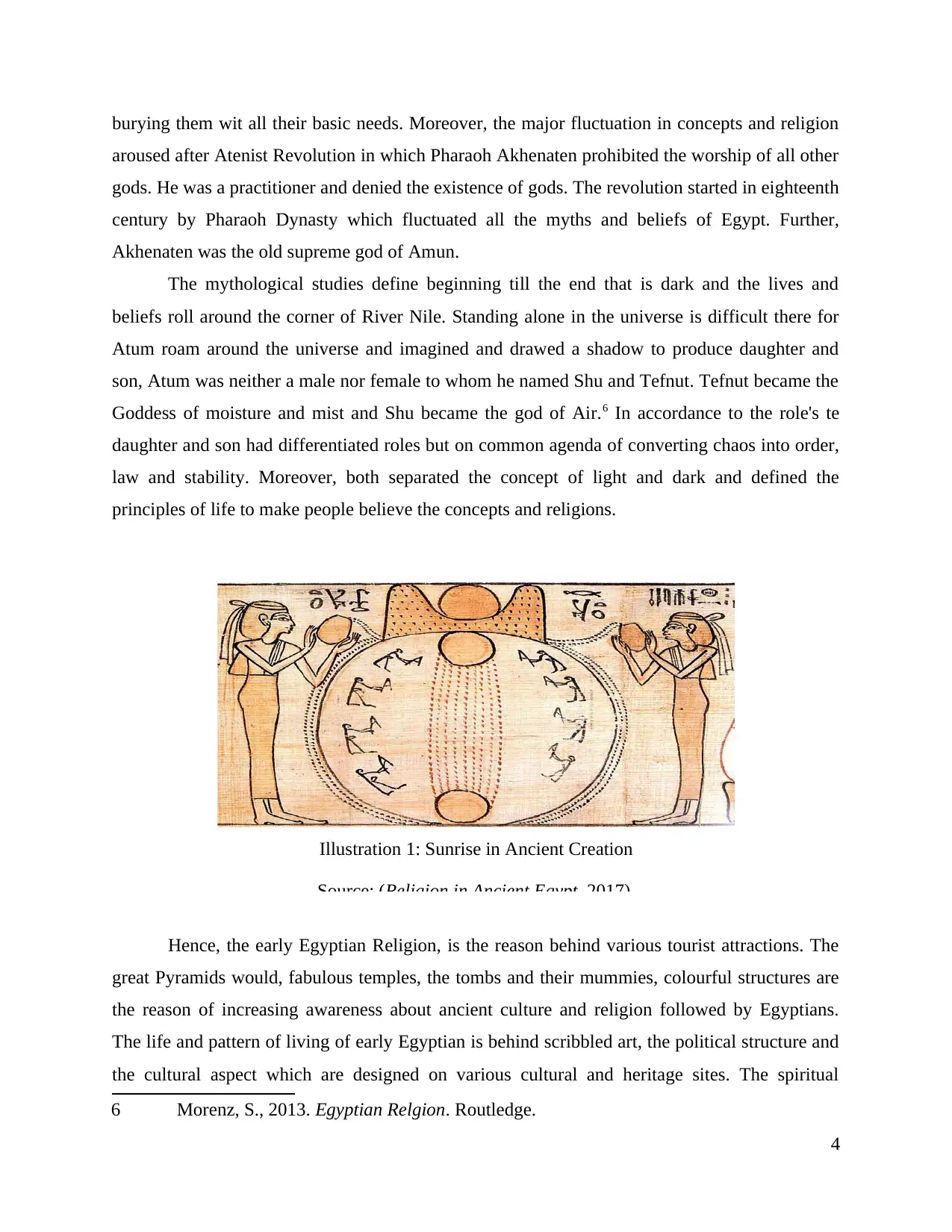
burying them wit all their basic needs. Moreover, the major fluctuation in concepts and religion
aroused after Atenist Revolution in which Pharaoh Akhenaten prohibited the worship of all other
gods. He was a practitioner and denied the existence of gods. The revolution started in eighteenth
century by Pharaoh Dynasty which fluctuated all the myths and beliefs of Egypt. Further,
Akhenaten was the old supreme god of Amun.
The mythological studies define beginning till the end that is dark and the lives and
beliefs roll around the corner of River Nile. Standing alone in the universe is difficult there for
Atum roam around the universe and imagined and drawed a shadow to produce daughter and
son, Atum was neither a male nor female to whom he named Shu and Tefnut. Tefnut became the
Goddess of moisture and mist and Shu became the god of Air.6 In accordance to the role's te
daughter and son had differentiated roles but on common agenda of converting chaos into order,
law and stability. Moreover, both separated the concept of light and dark and defined the
principles of life to make people believe the concepts and religions.
Hence, the early Egyptian Religion, is the reason behind various tourist attractions. The
great Pyramids would, fabulous temples, the tombs and their mummies, colourful structures are
the reason of increasing awareness about ancient culture and religion followed by Egyptians.
The life and pattern of living of early Egyptian is behind scribbled art, the political structure and
the cultural aspect which are designed on various cultural and heritage sites. The spiritual
6 Morenz, S., 2013. Egyptian Relgion. Routledge.
4
Illustration 1: Sunrise in Ancient Creation
Source: (Religion in Ancient Egypt, 2017).
aroused after Atenist Revolution in which Pharaoh Akhenaten prohibited the worship of all other
gods. He was a practitioner and denied the existence of gods. The revolution started in eighteenth
century by Pharaoh Dynasty which fluctuated all the myths and beliefs of Egypt. Further,
Akhenaten was the old supreme god of Amun.
The mythological studies define beginning till the end that is dark and the lives and
beliefs roll around the corner of River Nile. Standing alone in the universe is difficult there for
Atum roam around the universe and imagined and drawed a shadow to produce daughter and
son, Atum was neither a male nor female to whom he named Shu and Tefnut. Tefnut became the
Goddess of moisture and mist and Shu became the god of Air.6 In accordance to the role's te
daughter and son had differentiated roles but on common agenda of converting chaos into order,
law and stability. Moreover, both separated the concept of light and dark and defined the
principles of life to make people believe the concepts and religions.
Hence, the early Egyptian Religion, is the reason behind various tourist attractions. The
great Pyramids would, fabulous temples, the tombs and their mummies, colourful structures are
the reason of increasing awareness about ancient culture and religion followed by Egyptians.
The life and pattern of living of early Egyptian is behind scribbled art, the political structure and
the cultural aspect which are designed on various cultural and heritage sites. The spiritual
6 Morenz, S., 2013. Egyptian Relgion. Routledge.
4
Illustration 1: Sunrise in Ancient Creation
Source: (Religion in Ancient Egypt, 2017).
⊘ This is a preview!⊘
Do you want full access?
Subscribe today to unlock all pages.

Trusted by 1+ million students worldwide
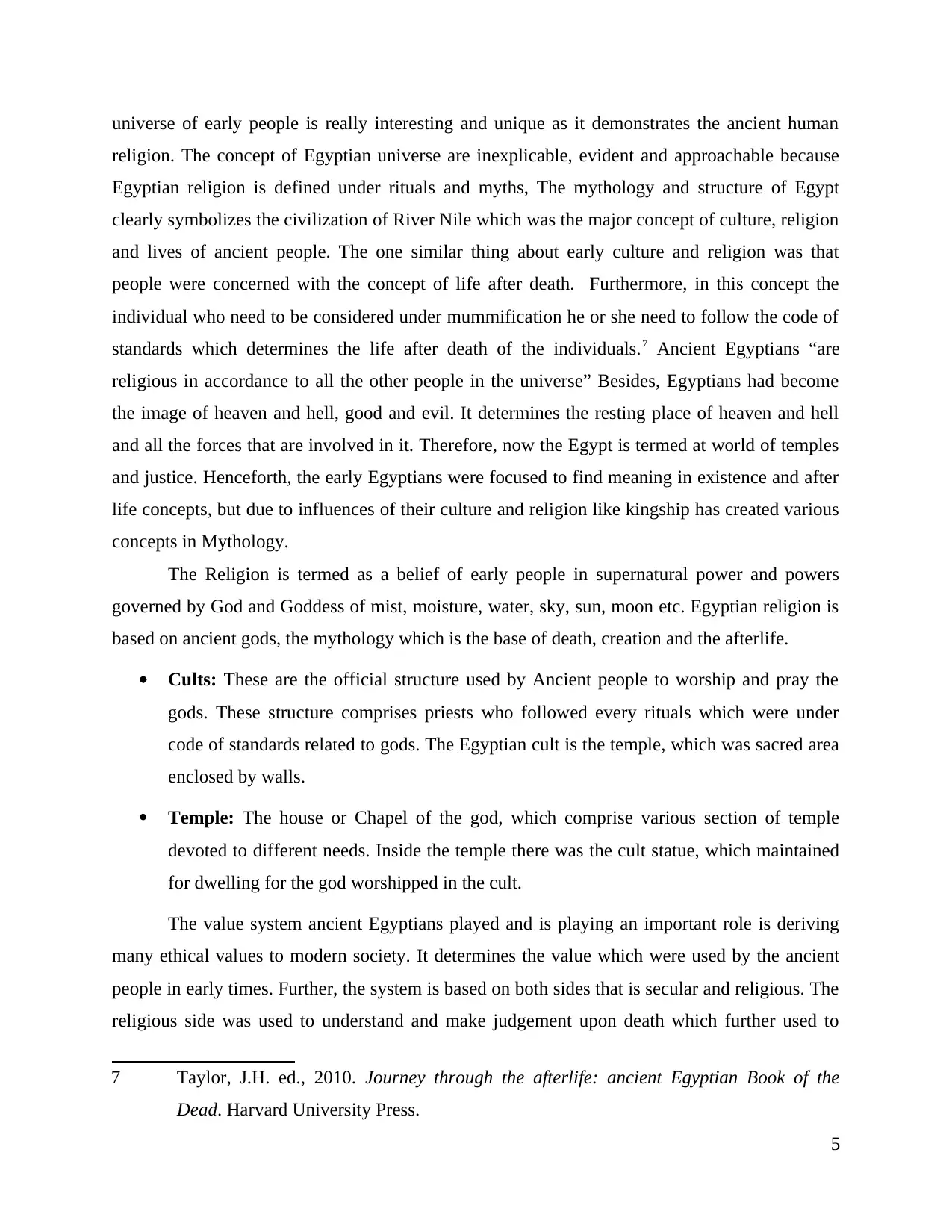
universe of early people is really interesting and unique as it demonstrates the ancient human
religion. The concept of Egyptian universe are inexplicable, evident and approachable because
Egyptian religion is defined under rituals and myths, The mythology and structure of Egypt
clearly symbolizes the civilization of River Nile which was the major concept of culture, religion
and lives of ancient people. The one similar thing about early culture and religion was that
people were concerned with the concept of life after death. Furthermore, in this concept the
individual who need to be considered under mummification he or she need to follow the code of
standards which determines the life after death of the individuals.7 Ancient Egyptians “are
religious in accordance to all the other people in the universe” Besides, Egyptians had become
the image of heaven and hell, good and evil. It determines the resting place of heaven and hell
and all the forces that are involved in it. Therefore, now the Egypt is termed at world of temples
and justice. Henceforth, the early Egyptians were focused to find meaning in existence and after
life concepts, but due to influences of their culture and religion like kingship has created various
concepts in Mythology.
The Religion is termed as a belief of early people in supernatural power and powers
governed by God and Goddess of mist, moisture, water, sky, sun, moon etc. Egyptian religion is
based on ancient gods, the mythology which is the base of death, creation and the afterlife.
Cults: These are the official structure used by Ancient people to worship and pray the
gods. These structure comprises priests who followed every rituals which were under
code of standards related to gods. The Egyptian cult is the temple, which was sacred area
enclosed by walls.
Temple: The house or Chapel of the god, which comprise various section of temple
devoted to different needs. Inside the temple there was the cult statue, which maintained
for dwelling for the god worshipped in the cult.
The value system ancient Egyptians played and is playing an important role is deriving
many ethical values to modern society. It determines the value which were used by the ancient
people in early times. Further, the system is based on both sides that is secular and religious. The
religious side was used to understand and make judgement upon death which further used to
7 Taylor, J.H. ed., 2010. Journey through the afterlife: ancient Egyptian Book of the
Dead. Harvard University Press.
5
religion. The concept of Egyptian universe are inexplicable, evident and approachable because
Egyptian religion is defined under rituals and myths, The mythology and structure of Egypt
clearly symbolizes the civilization of River Nile which was the major concept of culture, religion
and lives of ancient people. The one similar thing about early culture and religion was that
people were concerned with the concept of life after death. Furthermore, in this concept the
individual who need to be considered under mummification he or she need to follow the code of
standards which determines the life after death of the individuals.7 Ancient Egyptians “are
religious in accordance to all the other people in the universe” Besides, Egyptians had become
the image of heaven and hell, good and evil. It determines the resting place of heaven and hell
and all the forces that are involved in it. Therefore, now the Egypt is termed at world of temples
and justice. Henceforth, the early Egyptians were focused to find meaning in existence and after
life concepts, but due to influences of their culture and religion like kingship has created various
concepts in Mythology.
The Religion is termed as a belief of early people in supernatural power and powers
governed by God and Goddess of mist, moisture, water, sky, sun, moon etc. Egyptian religion is
based on ancient gods, the mythology which is the base of death, creation and the afterlife.
Cults: These are the official structure used by Ancient people to worship and pray the
gods. These structure comprises priests who followed every rituals which were under
code of standards related to gods. The Egyptian cult is the temple, which was sacred area
enclosed by walls.
Temple: The house or Chapel of the god, which comprise various section of temple
devoted to different needs. Inside the temple there was the cult statue, which maintained
for dwelling for the god worshipped in the cult.
The value system ancient Egyptians played and is playing an important role is deriving
many ethical values to modern society. It determines the value which were used by the ancient
people in early times. Further, the system is based on both sides that is secular and religious. The
religious side was used to understand and make judgement upon death which further used to
7 Taylor, J.H. ed., 2010. Journey through the afterlife: ancient Egyptian Book of the
Dead. Harvard University Press.
5
Paraphrase This Document
Need a fresh take? Get an instant paraphrase of this document with our AI Paraphraser
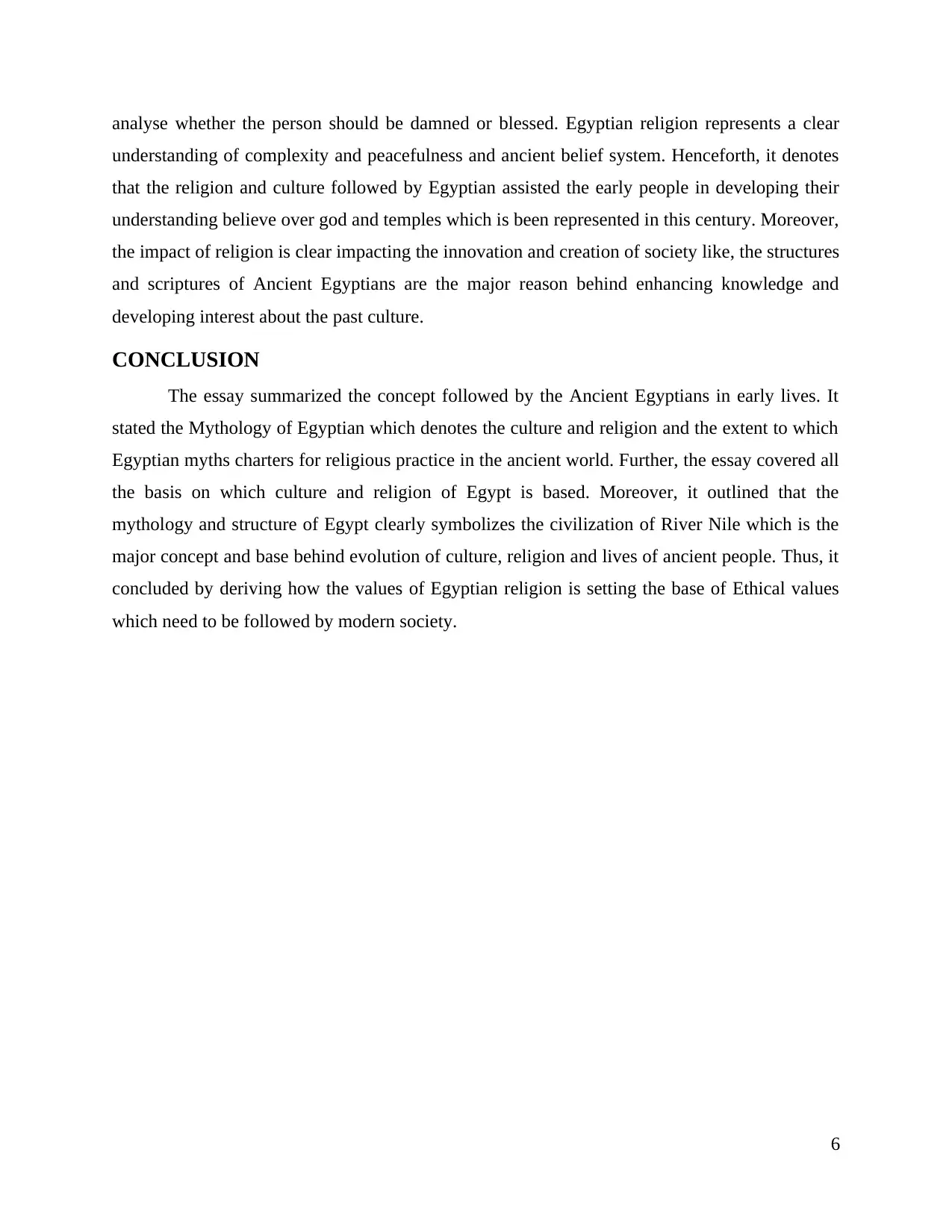
analyse whether the person should be damned or blessed. Egyptian religion represents a clear
understanding of complexity and peacefulness and ancient belief system. Henceforth, it denotes
that the religion and culture followed by Egyptian assisted the early people in developing their
understanding believe over god and temples which is been represented in this century. Moreover,
the impact of religion is clear impacting the innovation and creation of society like, the structures
and scriptures of Ancient Egyptians are the major reason behind enhancing knowledge and
developing interest about the past culture.
CONCLUSION
The essay summarized the concept followed by the Ancient Egyptians in early lives. It
stated the Mythology of Egyptian which denotes the culture and religion and the extent to which
Egyptian myths charters for religious practice in the ancient world. Further, the essay covered all
the basis on which culture and religion of Egypt is based. Moreover, it outlined that the
mythology and structure of Egypt clearly symbolizes the civilization of River Nile which is the
major concept and base behind evolution of culture, religion and lives of ancient people. Thus, it
concluded by deriving how the values of Egyptian religion is setting the base of Ethical values
which need to be followed by modern society.
6
understanding of complexity and peacefulness and ancient belief system. Henceforth, it denotes
that the religion and culture followed by Egyptian assisted the early people in developing their
understanding believe over god and temples which is been represented in this century. Moreover,
the impact of religion is clear impacting the innovation and creation of society like, the structures
and scriptures of Ancient Egyptians are the major reason behind enhancing knowledge and
developing interest about the past culture.
CONCLUSION
The essay summarized the concept followed by the Ancient Egyptians in early lives. It
stated the Mythology of Egyptian which denotes the culture and religion and the extent to which
Egyptian myths charters for religious practice in the ancient world. Further, the essay covered all
the basis on which culture and religion of Egypt is based. Moreover, it outlined that the
mythology and structure of Egypt clearly symbolizes the civilization of River Nile which is the
major concept and base behind evolution of culture, religion and lives of ancient people. Thus, it
concluded by deriving how the values of Egyptian religion is setting the base of Ethical values
which need to be followed by modern society.
6
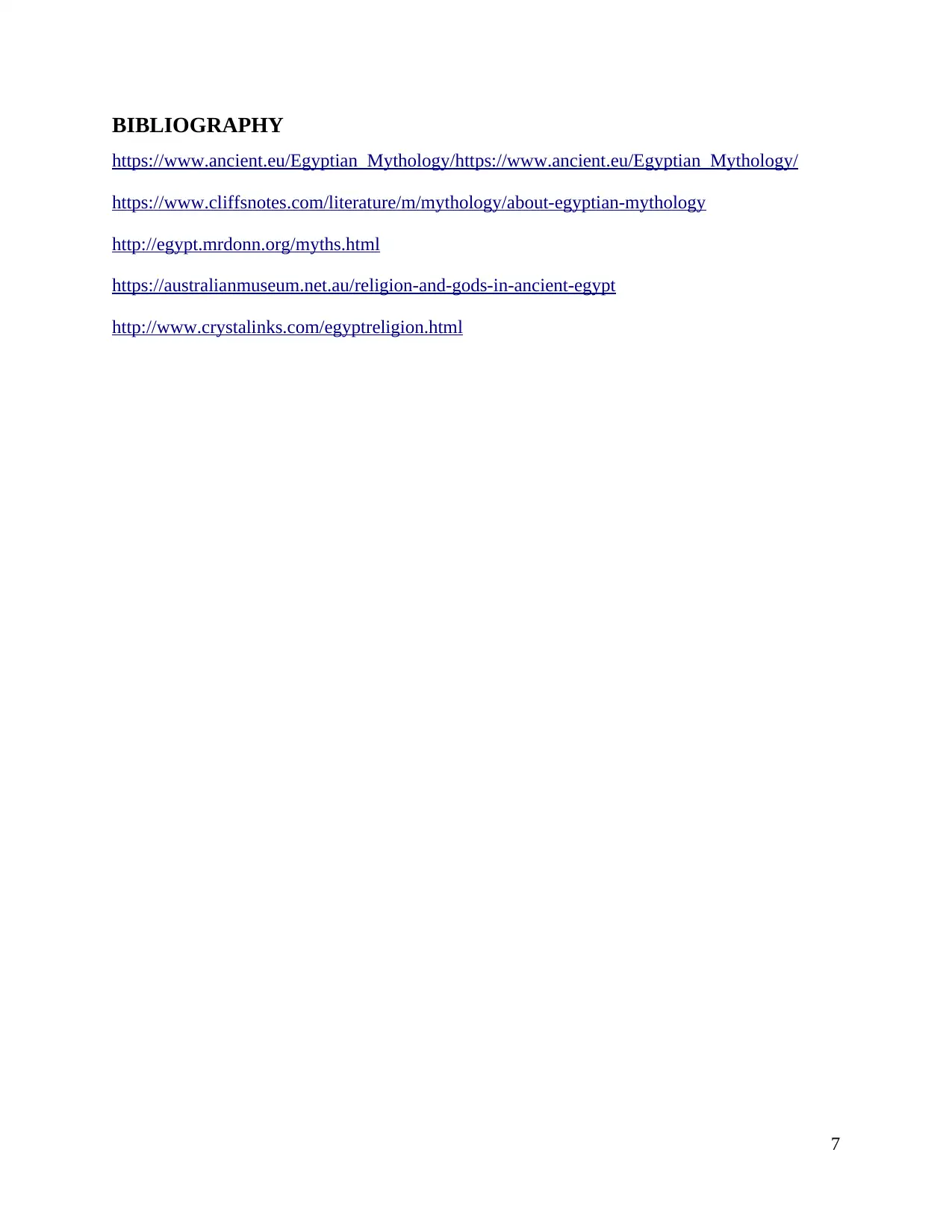
BIBLIOGRAPHY
https://www.ancient.eu/Egyptian_Mythology/https://www.ancient.eu/Egyptian_Mythology/
https://www.cliffsnotes.com/literature/m/mythology/about-egyptian-mythology
http://egypt.mrdonn.org/myths.html
https://australianmuseum.net.au/religion-and-gods-in-ancient-egypt
http://www.crystalinks.com/egyptreligion.html
7
https://www.ancient.eu/Egyptian_Mythology/https://www.ancient.eu/Egyptian_Mythology/
https://www.cliffsnotes.com/literature/m/mythology/about-egyptian-mythology
http://egypt.mrdonn.org/myths.html
https://australianmuseum.net.au/religion-and-gods-in-ancient-egypt
http://www.crystalinks.com/egyptreligion.html
7
⊘ This is a preview!⊘
Do you want full access?
Subscribe today to unlock all pages.

Trusted by 1+ million students worldwide
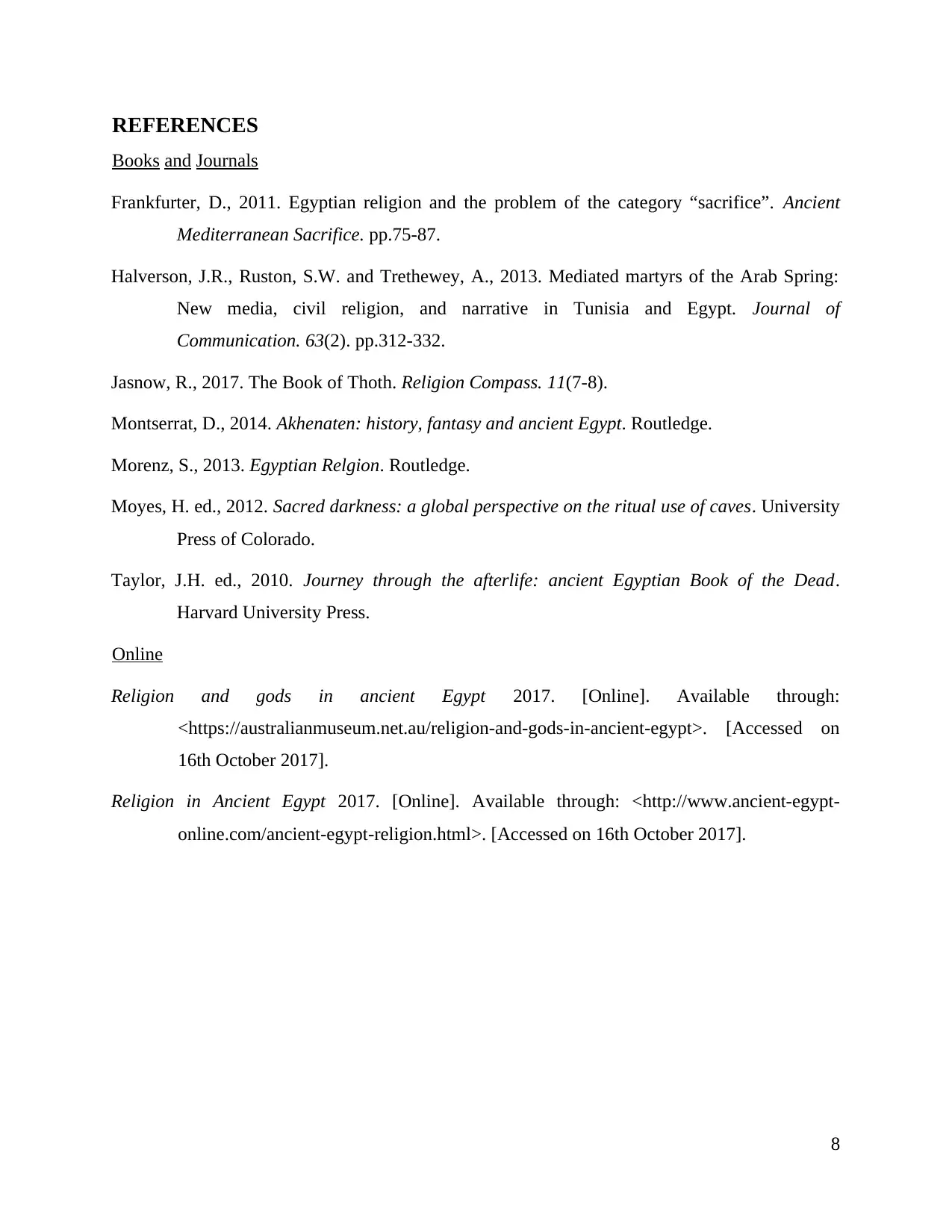
REFERENCES
Books and Journals
Frankfurter, D., 2011. Egyptian religion and the problem of the category “sacrifice”. Ancient
Mediterranean Sacrifice. pp.75-87.
Halverson, J.R., Ruston, S.W. and Trethewey, A., 2013. Mediated martyrs of the Arab Spring:
New media, civil religion, and narrative in Tunisia and Egypt. Journal of
Communication. 63(2). pp.312-332.
Jasnow, R., 2017. The Book of Thoth. Religion Compass. 11(7-8).
Montserrat, D., 2014. Akhenaten: history, fantasy and ancient Egypt. Routledge.
Morenz, S., 2013. Egyptian Relgion. Routledge.
Moyes, H. ed., 2012. Sacred darkness: a global perspective on the ritual use of caves. University
Press of Colorado.
Taylor, J.H. ed., 2010. Journey through the afterlife: ancient Egyptian Book of the Dead.
Harvard University Press.
Online
Religion and gods in ancient Egypt 2017. [Online]. Available through:
<https://australianmuseum.net.au/religion-and-gods-in-ancient-egypt>. [Accessed on
16th October 2017].
Religion in Ancient Egypt 2017. [Online]. Available through: <http://www.ancient-egypt-
online.com/ancient-egypt-religion.html>. [Accessed on 16th October 2017].
8
Books and Journals
Frankfurter, D., 2011. Egyptian religion and the problem of the category “sacrifice”. Ancient
Mediterranean Sacrifice. pp.75-87.
Halverson, J.R., Ruston, S.W. and Trethewey, A., 2013. Mediated martyrs of the Arab Spring:
New media, civil religion, and narrative in Tunisia and Egypt. Journal of
Communication. 63(2). pp.312-332.
Jasnow, R., 2017. The Book of Thoth. Religion Compass. 11(7-8).
Montserrat, D., 2014. Akhenaten: history, fantasy and ancient Egypt. Routledge.
Morenz, S., 2013. Egyptian Relgion. Routledge.
Moyes, H. ed., 2012. Sacred darkness: a global perspective on the ritual use of caves. University
Press of Colorado.
Taylor, J.H. ed., 2010. Journey through the afterlife: ancient Egyptian Book of the Dead.
Harvard University Press.
Online
Religion and gods in ancient Egypt 2017. [Online]. Available through:
<https://australianmuseum.net.au/religion-and-gods-in-ancient-egypt>. [Accessed on
16th October 2017].
Religion in Ancient Egypt 2017. [Online]. Available through: <http://www.ancient-egypt-
online.com/ancient-egypt-religion.html>. [Accessed on 16th October 2017].
8
1 out of 10
Related Documents
Your All-in-One AI-Powered Toolkit for Academic Success.
+13062052269
info@desklib.com
Available 24*7 on WhatsApp / Email
![[object Object]](/_next/static/media/star-bottom.7253800d.svg)
Unlock your academic potential
Copyright © 2020–2025 A2Z Services. All Rights Reserved. Developed and managed by ZUCOL.





